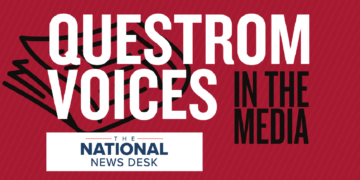Feb. 14 is Valentine’s Day – an occasion that traditionally combines romance with big business. One of the biggest businesses is selling roses, which Americans increasingly love. Back in 1989, about 1 billion cut roses were sold annually in the U.S. By 2023, that had risen to roughly 2.8 billion – enough to give every adult in the country a bouquet of 10.
As a business school professor who studies the economic impact of holidays, I wondered how much money Americans spend on roses each year while I was standing in line with two dozen red and pink ones for my sweetheart.
It’s not easy to find out. The National Retail Federation estimates people will spend US$2.6 billion on Valentine’s Day flowers, but that includes everything from azaleas to zinnias. The Society of American Florists says that 250 million roses are produced for the holiday, but it doesn’t estimate spending.
So I decided to investigate. And what I found was surprising: The roses in my hand were tied to the war on illegal drugs.
Where are those roses coming from?
Roses sold in the U.S. were once largely homegrown but are now mainly imported from South America. To learn more, I turned to the U.S. Department of Agriculture, which for decades has tracked the number of domestic farms and nurseries selling cut roses. These farms are different from nurseries growing rose bushes sold in pots to landscapers and gardeners.
Back in 1970, there were almost 800 U.S. commercial farms and nurseries growing cut roses. U.S. cut-rose growers were powerhouses, selling almost half a billion roses annually.
But since the 1970s, American cut-rose growers have withered away. The USDA’s latest Census of Horticultural Specialties found about 110 farms and nurseries growing cut roses. These farms harvested only about 18 million roses, which is quite a comedown over 50 years.
So where are roses coming from now? In 2023, the U.S. imported about 2.8 billion cut roses. The Netherlands, site of the world’s largest flower auction, isn’t the answer. Instead, cut roses sold in the U.S. primarily come from two places: Colombia and Ecuador. Colombia provides almost 60% of our roses, and Ecuador almost 40%.

Why Colombia and Ecuador?
The shift from U.S.-grown roses to South American ones happened a few decades ago, when the U.S. and Colombian governments were looking for new ways to stem the flow of cocaine into the U.S.
One part of the strategy was to convince farmers in Colombia to stop growing coca leaves – a traditional Andean plant that provides the raw ingredient for making cocaine – by giving them preferential access to U.S. markets if they grew something else.
So, in the early 1990s, Colombia and Ecuador signed the Andean Trade Promotion and Drug Eradication Act. Signing gave these coca-producing countries duty-free access to U.S. markets in exchange for clamping down on growing illegal drugs.
Whether the act stopped drug production is unclear, but many businesses in Colombia and Ecuador started growing and shipping flowers north.
Prices for roses
The vast quantity of roses coming up from Colombia and Ecuador has kept rose prices in check. The USDA has tracked the price of a dozen red hybrid tea roses – the ones you commonly see being offered to romantic partners on Valentine’s Day – sold in major supermarkets weekly since 2011. Back in 2011, a dozen roses would set a buyer back a bit over $10. In 2023, the same arrangement cost around two dollars more, a price increase of 20%. Inflation went up 35% over the same time, making roses comparatively cheaper.
While rose prices are low during much of the year, they have large seasonal swings. In a typical year, supermarket prices for a dozen roses double around Valentine’s Day. Last year, prices ranged from a low in August of about $8 to almost $23 before Valentine’s Day. While the USDA doesn’t track flower shop prices, visiting my local florist shows the cost of premium long-stem roses in vases is higher.
Why the price increase?
Prices rise around Valentine’s Day as all parts of the supply chain, from growers to wholesalers to retailers, are stressed during the buying surge.
The U.S. government tracks monthly the import price of single roses. In 2023, before Valentine’s Day, the average cut rose stem cost 40 cents coming off the cargo plane. This is higher than the annual low in August of 25 cents a stem. This means in August, roses cost wholesalers $3 a dozen, while a dozen Valentine’s Day roses cost $5 after clearing customs.
The USDA not only tracks prices in supermarkets but also wholesale flower prices in my city, Boston. Retail customers can’t buy flowers at these prices, since the flower market caters only to people in the trade. Just before Valentine’s Day 2024, Boston wholesalers were charging between $1 and $1.65 per stem of hybrid tea roses. Back in August 2023, they were selling roses for between 90 cents and $1.50 per stem. These wholesale prices suggest supermarkets don’t make much if any money selling roses most of the year, earning profits only during the peak holiday times.
While none of the sources directly answered my question on how much money Americans spent on roses each year, it’s easy to calculate a rough value. In 2023, there were around 2.8 billion cut roses sold. Given the average price in supermarkets over the whole year for a dozen roses was a bit over $12, this means people in the U.S. are spending more than $3 billion annually.
And if you’re buying roses for your sweetheart, like I did for mine, then you’re contributing to the roughly half a billion dollars worth of roses bought to say “I love you” at Valentine’s Day.
This article is republished from The Conversation under a Creative Commons license. Read the original article.

























